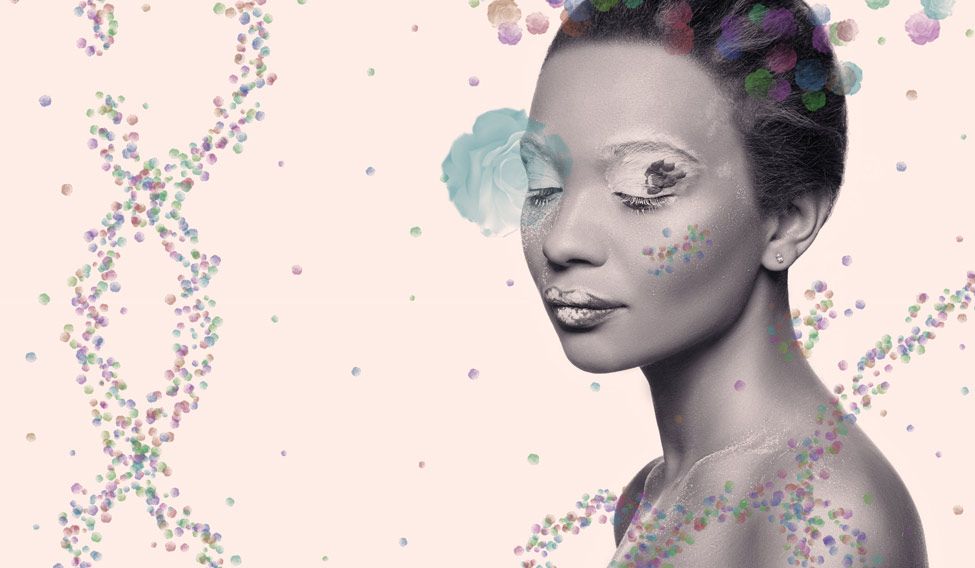What happened the last time you went for a facial? Or to buy a new moisturiser? Maybe someone examined your skin or asked about your skincare regime? Or perhaps they took a swab from the inside of your cheek, sent it off to a lab to analyse your DNA and then created a bespoke prescription and facial, based on your genetic code and a lifestyle questionnaire.
Sounds like science fiction? It isn't. In fact, skincare tailored to your genes is the latest in hi-tech beauty. Last September, one such company, Geneu, launched a pop-up shop in Selfridges department store, London, offering same-day DNA analysis. And, at the Mondrian hotel, on the South Bank, facialist Kate Kerr creates DNA facials based not only on what she can see, but also what a genetic test reveals.
Such personalisation is seductive. How many times have you tried the face cream your best friend swore by, only to discover it did nothing for you? According to the founder of Geneu, Professor Christofer Toumazou, who won an award for his high-speed DNA analysis technology, that is down to differences in our genes. “We all differ by 0.1 per cent,” he says. “We share the same genes, but it’s the specific version or mutation of those genes that makes us individual.”
Advances in technology have made it quicker, easier and cheaper to identify those differences—although not that cheap. For £89 (Rs 7,400), Geneu will test what it says are the two most important genes in skin ageing: one relates to how quickly your body breaks down collagen, the protein that keeps skin firm, and the other relates to the level of antioxidant protection your body has—its natural defence against free radicals, which are thought to speed up ageing. Using this information, you are prescribed a month’s supply of two personalised serums, each containing active ingredients, which start at a base price of £200 (Rs 16,600).
At that price, you would expect impressive ingredients, but I could not find anything you would not get in an off-the-shelf product, such as vitamins C, E, A and various peptides or proteins. However, Geneu’s CEO, Dr Martin Stow, says it is more about quantity: “Our serums are specifically formulated with the correct active ingredients at the right concentrations based on your DNA and lifestyle assessment.”
But what about SPF, the one thing almost all experts agree is essential for slowing skin ageing? “Our recommendation would be to always use a moisturiser with SPF or a specific SPF product on top of our serums,” Stow says.
Some people are sceptical, however. “DNA can be useful and informative,” says Dr Ewan Birney, who played a key role in sequencing the human genome in 2000 and is now director of the European Bioinformatics Institute. “But we have to be careful not to over-interpret what it can tell us.”
Which makes it pretty unlikely that just two genes can tell you how your skin will age, especially when so many other factors—sun exposure, smoking, stress and diet—are known to have an impact.
He points out that even if you can identify that someone has a genetic predisposition to faster collagen degradation, there is no strong evidence that giving them bespoke skincare produces a better result than giving them the same as everyone else.
For Kerr, whose £195 (Rs 16,200) test looks not only at collagen and antioxidants but also at three further aspects of skin ageing—vulnerability to inflammation, wrinkling and sun damage—it is about having the knowledge of what your skin needs. Crucially, she feels this sort of information can motivate patients to make the changes they need to. “When you see in black and white that you are genetically more prone to glycation [a process by which excess sugar can cause the collagen and elastin in the skin to stiffen, contributing to wrinkles and sagging], and you know it means eating more sugar is going to make your skin sag more than most people’s, it has an impact,” she says.
This makes sense to me, in a way that testing just two genes doesn’t. But many say it will be years before this technology is really useful. Olay, for example, is currently conducting a study in association with the Harvard Medical School, looking at gene expression in people who look exceptionally young for their age. So far, they have discovered about 2,000 genes that seem to be relevant, but Olay’s principal scientist, Dr Frauke Neuser, admits we are not at the point where we can tailor anti-ageing skincare to DNA. “The fundamental idea is great,” she says. “But there hasn’t been any successful research proving the validity of these approaches yet.”






